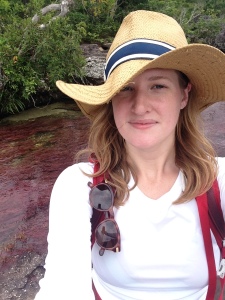
To learn more about the USAID Research and Innovation Fellowship, we caught up with current fellow Laura Seago, a PhD Candidate in Public Policy and Political Science at the University of Michigan. Laura’s PhD dissertation, The Allocation of Labor Repression in the Era of Globalization, explores the relationship between public and private provision of labor repression in the developing world, and shows that NGO scrutiny affects the allocation of repressive responsibility.
1. What inspired you to apply for the USAID Research and Innovation Fellowship?
I have been interested in economically-motivated human rights issues in the developing world, particularly Latin America, since I worked for a fair trade NGO in Guatemala while in college. I explored these issues in my desk research as a PhD candidate at the University of Michigan, but I was eager to spend time in the field. Because I study labor rights, I was particularly interested in Colombia, which has one of the highest rates of labor repression in the world. When I heard about the USAID Research and Innovation Fellowship, I jumped at the opportunity to conduct research in an international environment while continuing to make progress on my dissertation. My local host proposed a project that was closely related to my own work on the political economy of human rights, and offered invaluable support for my independent research.
2. What is a typical week like for a USAID Fellow?
I spend most of my time in the Economics department at la Universidad de Los Andes in Bogota, Colombia, where I divide my time between collaborating with faculty on research projects and working on my own dissertation and publications. Not all USAID fellows are housed in academic institutions; some work for NGOs, governments, and other organizations that could benefit from the presence of a visiting researcher. The fellowship has afforded me the opportunity to learn about the organizational culture of foreign universities, gain deep insight into the subnational case of Colombia, and collect data from local organizations that are unable to share information electronically. I travel within Colombia occasionally to conduct interviews and collect data, and my relatively long fellowship tenure (9 months) has allowed me to get to know the country well.
3. What tips would you give others applying to the USAID Research and Innovation Fellowship?
At the time I applied, the USAID Research and Innovation Fellowship was only open to current recipients of the NSF Graduate Research Fellowship, but USAID has now expanded the program to graduate students at select universities. One unique aspect of the fellowship is that host organizations propose specific research projects as a starting point, and applicants can then negotiate with hosts to develop a mutually beneficial research plan. Once a developing country institution agrees to host an applicant, the applicant then applies to the NSF and USAID with that endorsement. As a result of this structure, the most important part of the process is your preliminary discussions with your host. Be sure to be responsive and professional in those early communications, and emphasize the parallels between their proposed research project and your existing work. Your host will likely ask to converse about the project over Skype – treat this like a real interview!
Laura Seago is a Joint PhD Candidate in Public Policy and Political Science at the University of Michigan. She studies the political economy of conflict, and is particularly interested in the role of multinational corporations in civil violence and human rights outcomes. Laura is a 2011 winner of the National Science Foundation Graduate Research Fellowship. Prior to entering graduate school, Laura worked as a Research Associate at the Brennan Center for Justice and as Development Director at Latinos Progresando, a community-based immigration services agency in Chicago. She holds a BA from the University of Chicago and an MA from the University of Michigan.
© Victoria Johnson 2015, all rights reserved